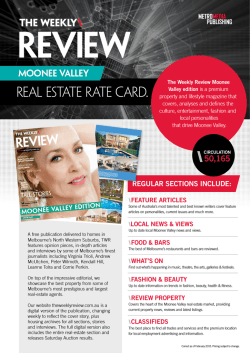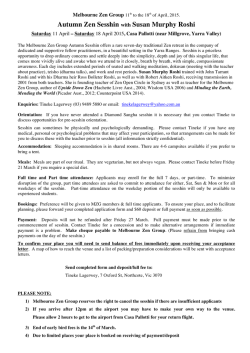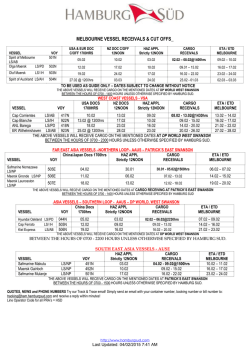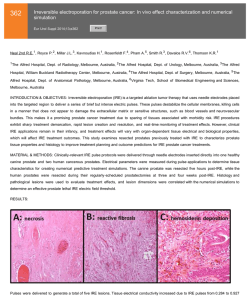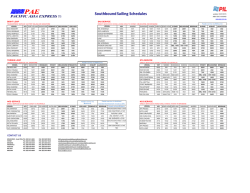
New regional food plan - Regional Development Victoria
Newsletter of the Northern Melbourne Regional Development Australia Committee (NMRDA) . Summer 2014 New regional food plan A comprehensive new strategic plan for the region’s food and beverage sector has found that there is potential to double turnover from $2.6 billion to $5 billion and create 7000 jobs over the next decade. The Food and Beverage Growth Plan for Melbourne’s North profiles this important sector, pinpoints areas of competitive advantage and identifies opportunities to grow the industry by highlighting blockers and strategies required to respond to them. Currently, the region has approximately 400 food and beverage businesses with a turnover of more than $1 million, generating a gross regional product of $2.6 billion per annum and employing over 10,500 workers. “Manufacturing is still a major industry and employer of our residents, but the end of vehicle building at the Ford plant in 2016 will have serious implications for the regional economy that can’t be underestimated,” said Bob McQuillen, Chair of NMRDA. “Expanding the food and beverage sector will offer valuable ongoing employment and opportunities for business growth that’s essential to our region.” Melbourne’s North is well positioned to be a hub for food and beverage. The region’s two universities – La Trobe University and RMIT University – have strong programs in the food science area, and Melbourne Polytechnic and Kangan Institute also deliver related courses. The relocation of the Melbourne Wholesale Fruit, Vegetable and Flower Market to Epping in 2015 will add to food and beverage manufacturing by strengthening the local supply chain and expertise. Report recommendations include establishing an industry-owned representative organisation, facilitating R&D for industry, improving skills development and labour availability, and actively promoting the region’s food and beverage sector. This project aligns with the Australian Government’s National Food Plan, which identifies the benefits of empowering food regions and the importance of developing regional food plans. Its aim is to increase the value of food related exports from Australia by 45% and to increase food productivity by 30% by 2025. Project partners: NMRDA; NORTH Link; Commonwealth Department of Employment; Victorian Department of State Development, Business and Innovation (Bundoora office); La Trobe University; RMIT University. Meeting NMRDA strategic priorities: • Growing business and industry, and fostering innovation • Promoting education and developing human capital WORKFORCE MASTER PLAN UNDER WAY This major project will analyse what employers require from their workforce now, future skills needs, and what training will be necessary (see page 3). Advocacy for infrastructure N MRDA and partners are approaching Victoria’s new state government to advocate for funding of key recommendations from NMRDA’s Northern Horizons: 50 Year Infrastructure Strategy for Melbourne’s North report. This report is a comprehensive regional analysis of all aspects of infrastructure that looks out over the next 50 years. It identifies the region’s need for enhanced infrastructure and improved access, particularly in relation to road infrastructure, public transport, social infrastructure (health and aged care facilities), gas and industrial zoned land. Using this analysis, the report identifies short, medium and long term priority projects for Melbourne’s North. The priority projects include: • a rail extension to Mernda • a new interchange at O’Herns Road • road duplications in key areas • removal of grade separations at various locations. Feedback from government on Northern Horizons, which presents an agreed regional approach from local government and other stakeholders, has been extremely positive. Project partners: NMRDA; NORTH Link; La Trobe University; Cities of Banyule, Darebin, Hume, Moreland, Whittlesea and Yarra; Shires of Nillumbik and Mitchell. Meeting NMRDA strategic priorities: • Transport and infrastructure for the future • Building a healthy community Advisors can cover a range of online activities including social media, online marketing, basic website development and low cost online solutions. NMRDA, in conjunction with the City of Banyule and the Darebin Enterprise Centre, initiated this project and worked with partners to establish and manage the incubator. Project partners: NMRDA; Australia Post; City of Banyule; Darebin Enterprise Centre. Meeting NMRDA strategic priorities: • Growing business and industry, and fostering innovation • Stimulating the digital economy Launch of digital business incubator B anyule digiDECL, a new digital business incubator in Melbourne’s North, was opened by the Hon. Wendy Lovell, Australia Post CEO Ahmed Fahour and Mayor of Banyule Craig Langdon in August. The co-working spaces available at the incubator are assisting home based businesses, start-up businesses and individual contractors by providing support services as well as the opportunity to network. Situated in West Heidelberg Mall, the facility is based on a new model of business incubation where businesses book time and space as required rather than occupy premises full time. It is designed to be a highenergy and community-minded workspace. Free one-on-one mentoring covers areas of specific interest to each member. Workforce Master Plan Local businesses going digital N Photos courtesy of Mercy Hospital for Women and La Trobe University. MRDA has commissioned a major Workforce Master Plan that will identify and anticipate future industry, employment and training requirements in Melbourne’s North over the next 10 years. The project will identify strategies to develop the skills of the local workforce so that they meet future business and industry demand. It will provide research and evidence for industry and workforce development, and a framework for industry, skills and employment growth. The region continues to face ongoing structural changes in employment. While manufacturing is still one of the biggest industries and largest employers, it is declining and this will continue with the departure of automotive manufacturing. This is in contrast to other industries that are experiencing growth, such as professional services, education and health. The Master Plan will include an action plan outlining initiatives required to adapt to future changes, and will detail a collaborative and strategic response involving industry, the three levels of government, and education stakeholders. Project partners: NMRDA; NORTH Link; La Trobe University; Cities of Banyule, Darebin, Hume, Moreland, Whittlesea and Yarra; Shires of Nillumbik and Mitchell; Melbourne Planning Authority; Northern Metropolitan Regional Management Forum. Meeting NMRDA strategic priorities: • Growing business and industry, and fostering innovation • Promoting education and developing human capital Local business owners have benefited from free digital technology workshops held across metropolitan Melbourne to increase business productivity and competitiveness. The workshops are the result of a metropolitan-wide survey that found enhancing use of existing digital technology would generate growth and improve business efficiencies. The survey and workshops were initiated by NMRDA and sponsored by Melbourne RDA committees. Guy Jenkin, owner of Jenkin Printing, signed up for a session on ‘Engage the Online Customer’ and was glad he did. “I’ve worked as an independent print broker for over 25 years but communications have changed and I need to keep up,” he said. “Where once I’d make calls or drop in on prospective customers, now people find out about services like mine online. “The workshop was great. I learned about social media, email marketing and a lot more. It was clear and I came away with a lot of ideas – just what I needed.” Project partners: NMRDA; NORTH Link; Melbourne East RDA; Southern Melbourne RDA; Western Melbourne RDA; Darebin Enterprise Centre; local councils across Melbourne. Meeting NMRDA strategic priorities: • Stimulating the digital economy • Growing business and industry, and fostering innovation WHAT’S GOING ON Regional Summit outcomes continue NMRDA partnered with La Trobe University, NORTH Link and seven local councils to deliver a major Regional Summit in 2013. The event brought 200 business, community and government leaders together to develop a shared vision for the region and identify the challenges and opportunities involved in building a strong and vibrant future. Themes identified through extensive stakeholder consultation now comprise NMRDA’s priorities and have guided the following activities generated by NMRDA together with its partners. • Growing industry and fostering innovation: The Food and Beverage Growth Plan for Melbourne’s North identifies strategies required to grow this important manufacturing sector. • Promoting education and developing human capital: A major Workforce Master Plan underway will identify strategies to develop local workforce skills to meet future business demand. • Building a healthy community: A recent project delivered over 2000 free health screenings for Centrelink clients in the region and found health levels well below the national average. • Fostering the arts and culture: A regional arts and culture group has been formed to grow jobs in this sector and promote local tourism across the region. • Transport and infrastructure for the future: Northern Horizons, a major infrastructure report, prioritises infrastructure needs from a regional perspective to inform government planning • Securing environmental sustainability: NMRDA is working with all governments to develop a regional approach to sustainability that will help businesses cut costs and increase productivity. • Stimulating the digital economy: Banyule digiDECL, a digital business incubator offering shared working space and support, recently opened in Heidelberg. Two major projects will bring a significant boost to the region’s position as a major food processing hub in 2015. • Melbourne’s Wholesale Fruit, Vegetable and Flower Market, moving to Epping in May, will become a modern, innovative trading and distribution precinct. • RMIT University is moving its food pilot plant to Bundoora. Local manufacturers will be able to access this facility for R&D to develop new products or enhance existing ones. About NMRDA The Northern Melbourne Regional Development Australia (NMRDA) Committee is funded by the Australian Government. It builds partnerships between all levels of government, local businesses, community groups and key regional stakeholders to provide strategic and targeted responses to economic, environmental and social issues affecting Melbourne’s North. Contact Tony Coppola Executive Officer, NMRDA Suite 16, Level 1 20 Enterprise Drive Bundoora VIC 3083 Rewarding business achievements Australian Office is recipient of the 2014 Northern Business Achievement Award for Innovation and Education, sponsored each year by NMRDA. A local manufacturer of premium office papers, stationery and envelopes, Australian Office supplies the retail, corporate and government sectors across Australia, New Zealand and the Pacific Islands. The Northern Business Achievement Awards acknowledge and celebrate the successes and achievements of small to medium sized enterprises in Melbourne’s North. MAJOR FOOD INFRASTRUCTURE IN 2015 T: 03 9935 0613 E: [email protected] www.rdv.vic.gov.au/nmrda Tony Coppola, Executive Officer of NMRDA with Mark Kerwin, General Manager Manufacturing at Australian Office
© Copyright 2026

